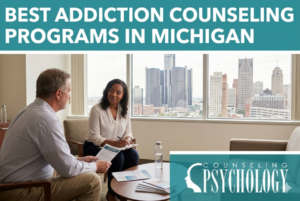Most Affordable Master’s Degree in Counseling Programs in Nashville, TN

Nashville, Tennessee, isn't just known for its music scene—it's also emerging as a major center for healthcare, education, and social services. As awareness of mental health challenges grows across the country, the need for well-trained, licensed counselors has reached unprecedented levels. According to the U.S. Bureau of Labor Statistics, employment of substance abuse, behavioral disorder, and mental health counselors is projected to grow 18% through 2032—a rate significantly faster than the national average. Within the Nashville metro area, this growth is amplified by a rapidly expanding population, an increasing number of mental health providers, and statewide efforts to improve access to behavioral healthcare.
For prospective mental health professionals, pursuing a master’s degree in counseling from an accredited and affordable institution in Nashville is a strategic and cost-effective step forward. Not only do these programs prepare graduates for licensure, but they also provide meaningful, hands-on experiences that lead to fulfilling careers in various clinical, educational, and community settings.
This guide outlines the most affordable master’s programs in counseling available in Nashville. Whether living locally or planning to relocate, students will find an array of flexible, high-quality educational opportunities that align with professional aspirations and financial needs.
2025 Affordable Master's in Counseling Programs in Nashville
Why Choose Nashville for a Master's in Counseling?
Nashville offers a dynamic backdrop for graduate education in counseling. The city is home to several universities that partner with community organizations, public schools, and healthcare providers to ensure students gain real-world experience. Tennessee ranks among the top states for healthcare employment, and Nashville, often called the "Silicon Valley of Health Care," stands out for its strong clinical infrastructure.
Students who choose to pursue their degree in Nashville benefit from a unique blend of urban opportunity and Southern hospitality. The city balances academic excellence with access to a variety of populations in need of mental health services—from inner-city youth and veterans to rural families and individuals experiencing homelessness.
Key advantages include:
- Strong university-to-community partnerships
- Exposure to diverse client populations in both rural and urban settings
- A collaborative mental health community offering supervision and networking
- A lower overall cost of living compared to similar metro areas like Atlanta or Dallas
- Proximity to Tennessee’s capital, expanding advocacy and public service opportunities
Key Features of Affordable Counseling Programs
Not all counseling programs are created equal. While affordability is important, students should also consider program quality, support services, and licensure alignment. The most affordable master’s programs in Nashville combine low tuition costs with features that enhance career readiness and long-term success.
Here are essential elements to look for:
- CACREP Accreditation: Ensures the program meets national standards required for licensure. Information about accreditation requirements can be found through the Council for Accreditation of Counseling and Related Educational Programs.
- Flexible Scheduling Options: Programs offering evening, weekend, or hybrid delivery formats accommodate working professionals and non-traditional students.
- Practicum and Internship Placements: Direct fieldwork experiences in clinics, schools, hospitals, or community organizations provide valuable training.
- Licensure Preparation: Programs should offer support for licensure exam prep, including the NCE and any required Tennessee-specific requirements.
- Support Services: Look for institutions that provide academic advising, supervision matching, career services, and mental health support for students.
By prioritizing programs with these characteristics, students can maximize their investment and graduate with the credentials and confidence to make a meaningful impact.
Licensure and Career Outlook in Tennessee
To become a Licensed Professional Counselor with Mental Health Service Provider designation (LPC-MHSP) in Tennessee, individuals must meet specific educational, clinical, and testing requirements. These include:
- Completing a master’s degree from a CACREP-accredited program
- Completing at least 60 graduate credit hours with specific coursework in counseling theory, ethics, assessment, and diagnosis
- Accumulating 3,000 hours of supervised post-graduate clinical experience
- Passing the National Counselor Examination (NCE) or an approved equivalent
For details on licensure requirements, refer to the Tennessee Department of Health.
The state is actively addressing shortages in mental health providers, particularly in underserved rural counties. Graduates of Nashville programs are well-positioned to secure employment across a variety of settings, often with additional loan forgiveness opportunities for working in high-need areas.
Common Employment Settings:
- Non-profit mental health agencies (e.g., Centerstone of Tennessee)
- Inpatient and outpatient behavioral health hospitals
- School-based counseling programs and educational institutions
- University counseling centers
- Private practice or group therapy practices
- Community health centers and faith-based organizations
Local Employers:
- Centerstone of Tennessee
- Mental Health Cooperative
- Vanderbilt University Medical Center
- Nashville CARES
Salary and Career Potential:
Licensed counselors in the Nashville-Davidson-Murfreesboro-Franklin metro area typically earn between $54,000 and $70,000 annually. Those who specialize in areas like trauma counseling, substance abuse, or adolescent therapy may command higher salaries. Demand is especially strong for counselors with bilingual capabilities or experience in rural outreach and telehealth.
How to Choose the Right Program
Selecting the right master's program in counseling goes beyond evaluating tuition rates. A comprehensive review of curriculum, fieldwork support, faculty expertise, and post-graduation outcomes can help prospective students make informed decisions.
Consider These Factors:
- Total Program Cost: Include tuition, university fees, books, and potential travel for internships.
- Format and Schedule: Part-time, hybrid, and evening formats may better align with employment or caregiving responsibilities.
- Accreditation and Licensure Alignment: Ensure the program meets Tennessee LPC-MHSP standards.
- Faculty Qualifications: Look for experienced, licensed professionals actively engaged in clinical work or research.
- Practicum Site Availability: Strong connections with local clinics and schools enhance hands-on training.
- Support Services: Academic advising, peer mentorship, and job placement resources can make a major difference.
Attending information sessions, scheduling campus visits, and speaking with alumni can also offer helpful insights before committing to a program.
Take the Next Step Toward a Counseling Career in Nashville
Nashville represents a vibrant and supportive environment for those preparing to enter the counseling profession. The combination of affordability, regional demand, and access to excellent training facilities makes the city a top choice for future LPCs. Whether aiming to work in school settings, clinical practice, or community-based care, local graduate programs can provide a strong foundation for licensure and long-term career success.
Affordable and accredited master's programs outlined in this guide empower students to gain essential skills while staying within budget. By pursuing counseling education in Nashville, graduates join a community of compassionate professionals committed to improving mental health outcomes across Tennessee and beyond.
Sources
- Bureau of Labor Statistics
- Tennessee Department of Health – Licensure
- Centerstone of Tennessee
- Council for Accreditation of Counseling and Related Educational Programs (CACREP)
- Mental Health Cooperative



